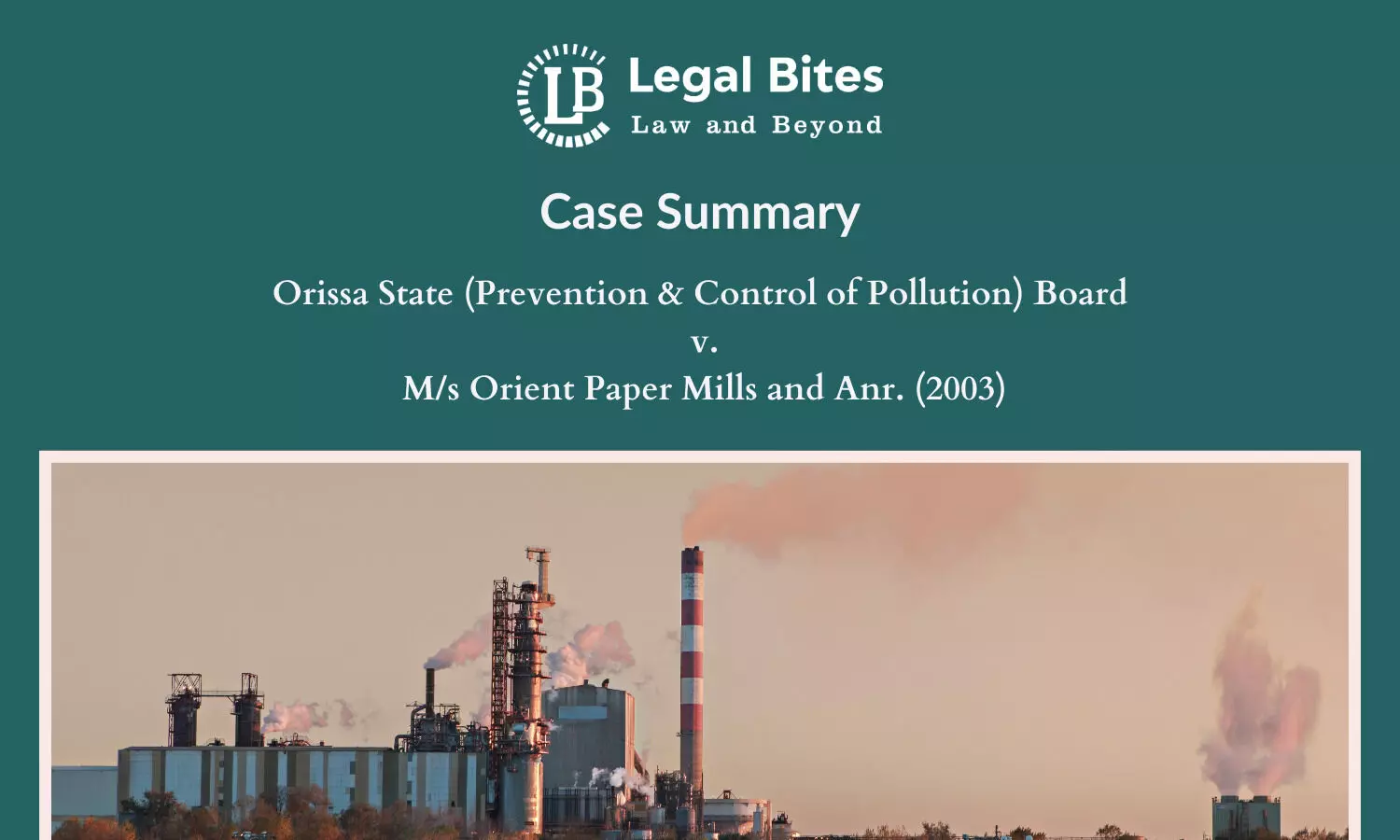Case Summary: Orissa State (Prevention & Control of Pollution) Board v. M/s Orient Paper Mills and Anr. (2003) | Strengthening Industrial Accountability in Pollution Control
This case affirms state authority to enforce pollution laws without detailed rules, highlighting the need for industry compliance.;

The case Orissa State (Prevention and Control of Pollution) Board v. M/s Orient Paper Mills and Anr. (2003) primarily addresses the issue of industrial air pollution and the authority of the state government to declare areas as Air Pollution Control Areas under the Air (Prevention and Control of Pollution) Act, 1981.Case Title: Orissa State (Prevention & Control of Pollution) Board v. M/s Orient Paper Mills and Anr.Court: Supreme Court of IndiaCitation: (2003) 10 SCC 421Bench: Brijesh...
The case Orissa State (Prevention and Control of Pollution) Board v. M/s Orient Paper Mills and Anr. (2003) primarily addresses the issue of industrial air pollution and the authority of the state government to declare areas as Air Pollution Control Areas under the Air (Prevention and Control of Pollution) Act, 1981.
Case Title: Orissa State (Prevention & Control of Pollution) Board v. M/s Orient Paper Mills and Anr.
Court: Supreme Court of India
Citation: (2003) 10 SCC 421
Bench: Brijesh Kumar & A.R. Lakshmanan (JJ.)
Date of Judgment: 10/03/2003
Facts of the Case
The Orissa State Pollution Control Board filed a complaint against M/s Orient Paper Mills, Brajraj Nagar, for violating the provisions of the Air (Prevention and Control of Pollution) Act, 1981. The industry was found to be emitting suspended particulate matter (SPM) over the tolerance limits set by the pollution control standards.
The Board had granted consent to the industry to operate within specified limits, but the industry failed to comply with the standards, particularly in boilers No. 9 and 10. The emissions were found to exceed the permissible limits during repeated inspections, and the results were communicated to the industry. Due to this violation, the Board initiated legal proceedings against the industry under Section 37(1) of the Air (Prevention and Control of Pollution)) Act (hereinafter referred to as Air Act) for not complying with the conditions set out in Sections 21 and 22 of the Act.
The Sub-Divisional Judicial Magistrate (SDJM) framed charges under Section 37(1) of the Air Act, but the industry challenged this decision in the Sessions Court. The Sessions Court quashed the charges, stating that the area where the industry was located had not been declared as an Air Pollution Control Area following the proper procedure under Section 19 of the Act. The High Court upheld the decision of the Sessions Court.
The Pollution Control Board appealed this decision in the Supreme Court.
Issues Raised
- Whether the State Government’s notification of the area as an Air Pollution Control Area was valid under Section 19 of the Air Act, 1981.
- Whether the absence of rules prescribing the procedure for declaring an area as an Air Pollution Control Area invalidates the notification.
- Whether the charges framed under Section 37(1) of the Act for violation of Sections 21 and 22 were justifiable despite the Sessions Court quashing them.
Legal Provisions Involved
(1) Section 19 of the Air (Prevention and Control of Pollution) Act, 1981
(2) Section 21 of the Air (Prevention and Control of Pollution) Act, 1981
(3) Section 22 of the Air (Prevention and Control of Pollution) Act, 1981
(4) Section 37(1) of the Air (Prevention and Control of Pollution) Act, 1981
(5) Section 54 of the Air (Prevention and Control of Pollution) Act, 1981
Judgment
The Supreme Court ruled in favour of the Orissa State Pollution Control Board. The Court held:
Validity of the Notification: The Court observed that the power to declare an area as an air pollution control area under Section 19 of the Act is vested in the State Government, which must consult the State Pollution Control Board before making such a declaration. The absence of specific rules prescribing the manner for such a declaration does not invalidate the notification.
The Court emphasized that the use of the term "may" in Section 19 provides flexibility, meaning the power can still be exercised even in the absence of rules, as long as the notification is published in the official gazette.
Absence of Rules: The Court further clarified that while Section 54 allows the State Government to make rules, the absence of such rules does not curtail the government’s power to declare an area as an air pollution control area. As long as the notification is issued in the official gazette, it is valid.
The Court rejected the argument that the declaration must follow a prescribed manner, ruling that the notification process itself is sufficient to enforce the provisions of the Air Act.
Framing of Charges: The Supreme Court set aside the order of the Sessions Court and the High Court, stating that the absence of specific rules did not negate the validity of the notification or the charges framed against the industry.
The proceedings in the trial court were to be resumed, and the charges against the respondents under Section 37(1) for violating Sections 21 and 22 of the Air (Prevention and Control of Pollution) Act were valid.
Conclusion
The Supreme Court reinstated the charges against M/s Orient Paper Mills for violating the pollution control standards under the Air (Prevention and Control of Pollution) Act, 1981. The Court’s ruling clarified that the power to declare an air pollution control area is vested in the State Government and can be exercised even without specific rules prescribing the manner of declaration. As long as the notification is issued in the official gazette, it is valid and enforceable.
The judgment reaffirms the importance of controlling industrial emissions and emphasizes that industries must comply with environmental standards, regardless of procedural ambiguities in the declaration of pollution control areas. This case serves as a precedent for ensuring that pollution control regulations are enforced effectively to protect public health and the environment.
Click Here to Read the Full Judgment





